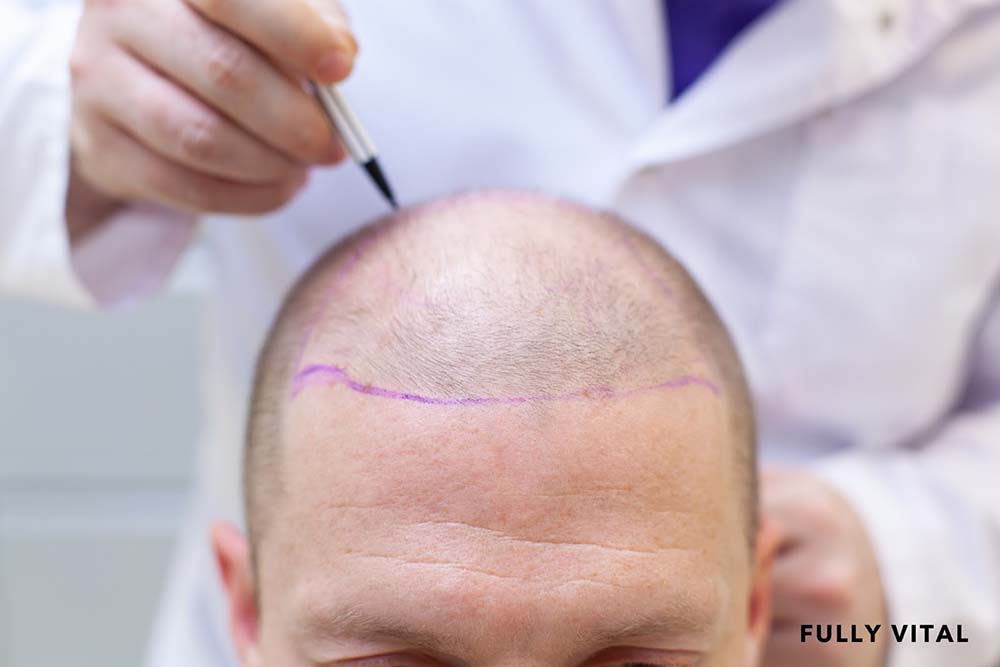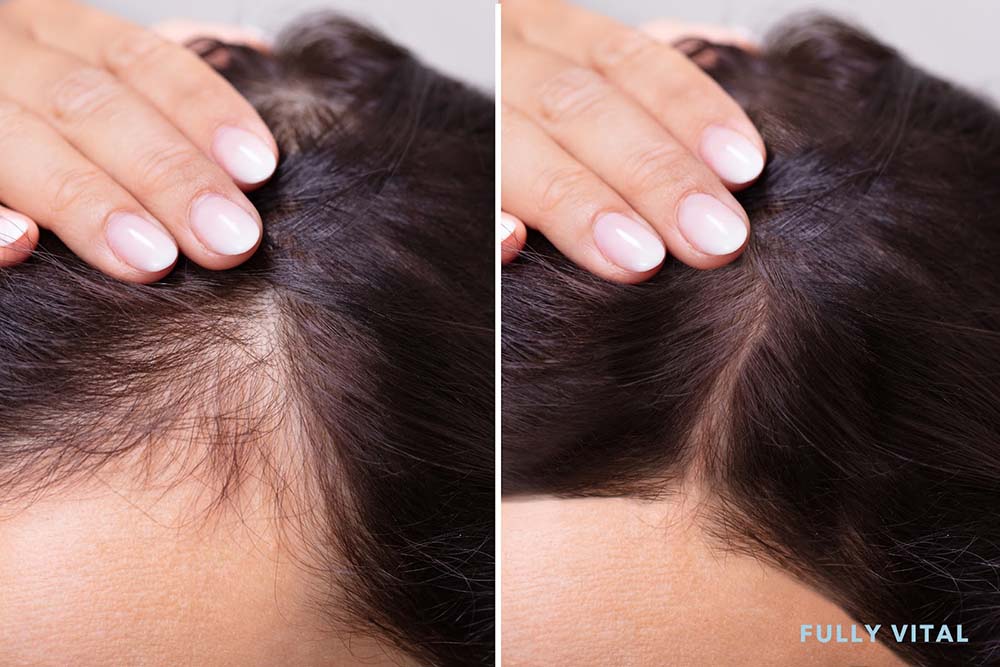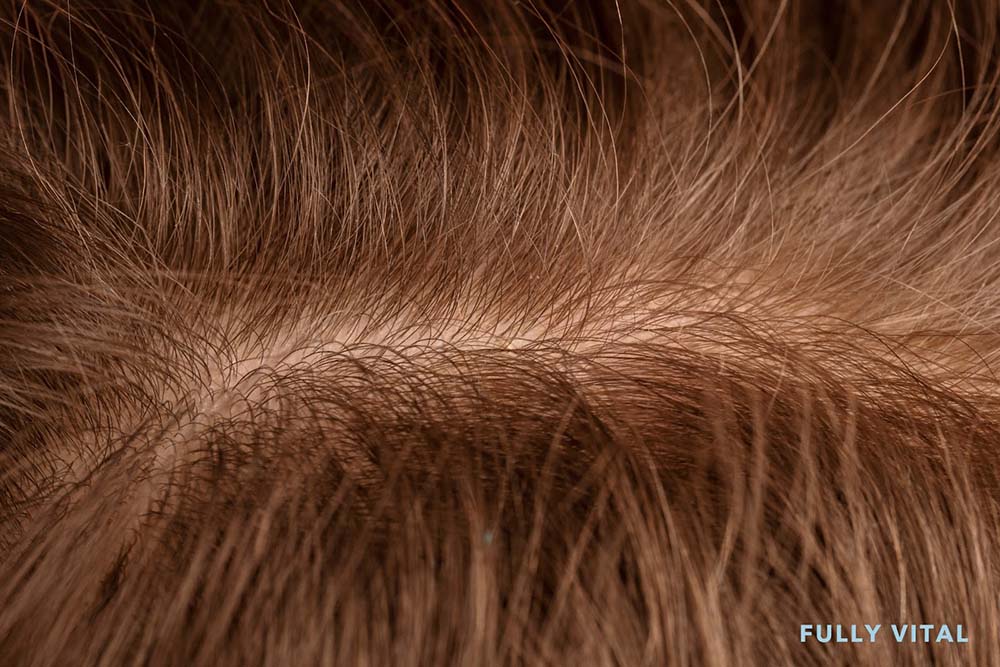
Flap Surgery For Hair Growth: Everything You Need To Know
If you're someone struggling with hair loss and looking for ways to stimulate hair growth, you may have come across the term "flap surgery."
In this comprehensive article, we'll cover all the essential aspects of flap surgery, its benefits, how it works, and alternative options, catering to the needs of women of all hair types who seek effective hair restoration solutions.
So, let's dive in!

I LOVE MY HAIR NOW
FullyVital hair serum and hair vitamins made tremendous improvements in my hair. I truly love my hair now.
Dorit S.,
What Is Flap Surgery?
Flap surgery is a surgical procedure used to address hair loss caused by various factors, such as genetics, trauma, or medical conditions.
Unlike other hair transplant techniques, flap surgery involves the relocation of hair-bearing skin from one part of the scalp to another.
This process allows the transplantation of a more extensive area of hair at once, making it an ideal option for individuals with significant hair loss.
During flap surgery, the surgeon designs a flap of skin with hair from the donor area, typically located on the side or back of the scalp.
The flap is then carefully lifted and moved to the recipient area, where hair growth is desired.
The surgeon skillfully sutures the donor site, ensuring minimal scarring.

Why Is Flap Surgery Important?
Flap surgery offers a viable and effective solution for individuals who have tried non-surgical hair growth treatments without significant results.1
Many people experience emotional distress due to hair loss, affecting their self-esteem and confidence.
Flap surgery can help them regain a full head of hair, providing a long-term remedy to their hair loss concerns.
For women of all hair types looking to stimulate hair growth, this procedure opens up new possibilities for a more confident and vibrant life.
How Does Flap Surgery Work?
Flap surgery is performed under local anesthesia, ensuring a painless and comfortable experience for the patient.
The procedure typically involves the following steps:
Consultation
During the initial consultation, the surgeon assesses the patient's hair loss condition, discusses their expectations, and determines whether they are a suitable candidate for flap surgery.2
Preparation
Before the surgery, the patient is instructed on pre-operative care and provided with guidelines to follow, such as avoiding certain medications that may interfere with the procedure.
Designing The Flap
The surgeon carefully designs the flap to ensure it aligns with the patient's hairline and desired density.
Harvesting The Flap
On the day of the surgery, the flap is harvested from the donor area with meticulous precision.
Transplantation
The surgeon transplants the flap to the recipient area, where it integrates with the existing blood supply, enabling hair growth.
Post-Operative Care
After the surgery, the patient receives post-operative care instructions to facilitate proper healing and minimize discomfort.
What Are The Benefits Of Flap Surgery?
Flap surgery offers several compelling benefits that make it an attractive option for hair restoration:
Permanent And Natural Hair Growth
Unlike temporary solutions, flap surgery results in permanent hair growth, providing patients with a lasting solution for their hair loss concerns.
High Success Rate
Flap surgery has a high success rate when performed by experienced and skilled surgeons, offering patients the best chance of achieving their desired outcomes.
Versatility For All Hair Types
Flap surgery is versatile and suitable for women of all hair types, making it an inclusive and effective procedure for various hair loss conditions.
Restored Confidence
Hair loss can significantly impact a person's self-esteem. Flap surgery can help restore confidence and improve overall well-being.
Are There Any Downsides To Flap Surgery?
While flap surgery offers promising results, it's essential to consider the potential downsides and risks associated with any surgical procedure:
-
Surgical Risks: As with any surgery, flap surgery carries inherent risks, including infection, bleeding, scarring, and anesthesia-related complications. However, these risks can be minimized by choosing a qualified and experienced surgeon.3
-
Recovery Time: Flap surgery involves a recovery period during which patients need to take special care to ensure proper healing. Activities may be restricted during this time, and patients should follow their surgeon's post-operative instructions diligently.
-
Cost: Flap surgery can be a significant financial investment, and insurance coverage may vary depending on individual policies. Patients should inquire about potential insurance coverage before undergoing the procedure.
Our Best Sellers
What Are The Alternatives To Flap Surgery?
While flap surgery is a reliable and effective option for hair restoration, some individuals may prefer exploring less invasive alternatives.
Here are some viable options to consider:
Hair Growth Medications
Medications like minoxidil and finasteride are FDA-approved for hair loss treatment.
They can be applied topically or taken orally and may help promote hair growth, especially in the early stages of hair loss.
Low-Level Laser Therapy (LLLT)
LLLT devices use laser light to stimulate hair follicles and encourage hair growth.
This non-invasive option is gaining popularity due to its convenience and potential effectiveness.
Hair Transplantation
Similar to flap surgery, hair transplantation involves relocating hair follicles from one area to another, but on a smaller scale.
It is suitable for specific cases of hair loss and may be a more suitable option for those with limited donor hair.
Lifestyle Changes
In some cases, hair loss can be managed by adopting a healthy lifestyle, including a balanced diet, stress reduction, and proper hair care.
Nutritional supplements with vitamins and minerals essential for hair health may also be beneficial.
What Is The History Of Flap Surgery?
Flap surgery has a rich history dating back several decades.
It emerged as one of the pioneering techniques in hair restoration during the mid-20th century.
Over the years, advancements in medical technology and surgical techniques have significantly improved the outcomes and safety of flap surgery.
Some key points in the history of flap surgery include:
-
1950s: Flap surgery was introduced as a hair restoration technique, initially used to address baldness caused by trauma and burns.
-
1960s-1970s: Surgeons refined flap surgery methods, exploring different flap designs and improving surgical instruments for better precision.
-
1980s-1990s: Microsurgical techniques were incorporated into flap surgery, leading to more refined and natural-looking results.
-
2000s-2020s: Flap surgery continued to evolve, with advancements in graft harvesting and transplantation techniques, making the procedure even more effective and accessible.
Our Best Sellers
What Is The Current Environment Of Flap Surgery?
In the present day, flap surgery remains a crucial and sought-after solution for individuals experiencing significant hair loss.
The current environment of flap surgery is characterized by:
-
High Demand: Flap surgery continues to be in high demand as more individuals seek reliable and permanent hair restoration solutions.
-
Refined Techniques: Surgeons now use microsurgical instruments and advanced grafting methods, leading to minimal scarring and natural hair growth.
-
Medical Expertise: Skilled surgeons with expertise in hair restoration perform flap surgery, ensuring patients receive the best possible care.
What Is The Future Of Flap Surgery?
As technology and medical knowledge continue to progress, the future of flap surgery holds promising developments. Anticipated advancements include:
-
Minimally Invasive Techniques: Future innovations may lead to even less invasive flap surgery procedures, reducing recovery time and making the surgery more accessible to a wider range of patients.
-
Improved Grafting Methods: Advancements in grafting techniques may further enhance the precision and effectiveness of flap surgery, resulting in seamless and natural-looking hair restoration.
-
Personalized Solutions: The future of flap surgery may involve more tailored approaches, considering individual hair loss patterns and patient preferences to achieve highly customized results.
Will I Need To Shave My Entire Head For Flap Surgery?
For most flap surgery procedures, shaving the entire head is not necessary.
The surgeon will carefully design the flap and strategically choose the donor area to minimize visible scarring and maintain natural-looking results.
In some cases, a small portion of the donor area may need to be trimmed, but the rest of the hair can be left untouched.
The surgeon will discuss the extent of hair trimming required during the pre-operative consultation.
Are There Any Age Restrictions For Flap Surgery?
Flap surgery can be performed on individuals of various age groups, but it is essential to consider individual factors and hair loss progression.
While there is no specific age restriction, the surgeon will assess the patient's overall health and suitability for the procedure.
Younger patients with premature hair loss may not be ideal candidates as their hair loss pattern could still be evolving.
It is best to consult with a qualified surgeon to determine the most appropriate timing for flap surgery.
Can Flap Surgery Be Performed On Eyebrows Or Facial Hair?
Yes, flap surgery can be performed not only on the scalp but also on other areas of the body, including eyebrows and facial hair.
This procedure is suitable for individuals who have experienced hair loss in these regions and wish to restore their appearance.
The surgeon will tailor the flap design and transplantation technique to ensure natural-looking results that complement the patient's facial features.
What Is The Typical Cost Range For Flap Surgery?
The cost of flap surgery can vary based on several factors, such as the extent of hair loss, the complexity of the procedure, the surgeon's experience, and the location of the clinic.
On average, flap surgery can cost between $5,000 to $15,000 or more.
It's essential to discuss the cost and any available financing options during the initial consultation with the surgeon or the clinic's representative.
Are There Any Specific Lifestyle Changes I Should Make Before Flap Surgery To Optimize Results?
Preparing for flap surgery involves adopting certain lifestyle changes to optimize the procedure's success and minimize complications.
Here are some essential pre-operative steps:
-
Quit Smoking: Smoking can interfere with the body's healing process and increase the risk of complications. It is advisable to quit smoking at least a few weeks before the surgery.
-
Avoid Alcohol and Blood-Thinning Medications: Alcohol and blood-thinning medications can increase the risk of bleeding during surgery. Patients should refrain from consuming alcohol and certain medications as advised by the surgeon.
-
Maintain a Healthy Diet: A balanced diet rich in essential nutrients can promote better healing and improve overall health, contributing to successful surgery outcomes.
-
Stay Hydrated: Proper hydration is crucial for general health and supports the body's recovery process. Ensure you drink an adequate amount of water leading up to the surgery.
-
Follow Pre-Operative Instructions: The surgeon will provide specific pre-operative guidelines tailored to each patient's needs. These may include instructions on when to stop eating or drinking before the surgery.
Experience the Power of Fully Vital Hair Growth Products!Discover the secret to unlocking the full potential of your hair with Fully Vital's science-backed hair growth products. Say goodbye to hair aging and embrace a healthier, more vibrant relationship with your locks. Key Features:
Benefits:
|
Final Thoughts On Flap Surgery
Flap surgery presents a significant opportunity for individuals seeking to address hair loss and stimulate hair growth.
This surgical procedure offers a permanent and natural-looking solution for a wide range of hair loss conditions, instilling confidence and transforming lives.
From understanding the benefits and downsides of flap surgery to exploring alternatives and preparing for the procedure, we've covered all the essential aspects in this article.
At Fully Vital, we are committed to helping you have a healthier relationship with your hair.
Our variety of hair growth products are designed to stop the aging of your hair and promote natural, vibrant locks.
Whether you choose flap surgery or explore non-surgical options, our products can complement your journey toward achieving the luscious hair you desire.
Frequently Asked Questions About Flap Surgery
Who is an ideal candidate for flap surgery?
Flap surgery is typically recommended for individuals with significant hair loss, good overall health, and adequate donor hair.
Ideal candidates should have realistic expectations about the procedure's outcomes.
Is flap surgery painful?
Flap surgery is performed under local anesthesia, so patients should not experience pain during the surgery.
After the procedure, patients may experience some discomfort and soreness, but this can be managed with prescribed pain medication.
What can I expect during the recovery period?
The recovery period after flap surgery can vary depending on individual healing rates.
Swelling, soreness, and scabbing may occur initially but usually subside within a few weeks.
Patients should follow their surgeon's post-operative care instructions for a smooth recovery.
Are the results of flap surgery permanent?
Yes, the transplanted hair should continue to grow naturally in the new location for the long term.
The results of flap surgery are considered permanent.
When will I see the final results?
Patience is key when it comes to seeing the final results of flap surgery.
It may take several months for the transplanted hair to grow fully and achieve the desired density.
The timeline for visible results can vary from person to person.
Are there any specific post-operative care instructions to follow?
Yes, patients must follow their surgeon's post-operative care instructions diligently.
These instructions may include how to clean the area, medications, and restrictions on activities to aid in proper healing and minimize the risk of complications.
Can flap surgery be combined with other hair growth treatments?
In some cases, surgeons may recommend combining flap surgery with other hair growth treatments to enhance results.
However, this decision depends on the patient's individual needs and the surgeon's assessment.
What is the success rate of flap surgery?
Flap surgery has a high success rate when performed by experienced and skilled surgeons.
The success rate may vary based on the patient's unique circumstances and adherence to post-operative care instructions.
Will there be visible scarring after flap surgery?
Skilled surgeons aim to minimize scarring, and any scars should be well-concealed within the hairline.
However, it's essential to discuss potential scarring with the surgeon during the consultation.
Is flap surgery covered by insurance?
Insurance coverage for flap surgery may vary, as it depends on individual policies and the reason for hair loss.
Patients should check with their insurance providers to determine coverage eligibility.
Sources:
-
Lin, S., Hanasono, M., & Skoracki, R. (2008). Scalp and Calvarial Reconstruction. Seminars in Plastic Surgery, 22(04), 281–293. https://doi.org/10.1055/s-0028-1095887
-
Farjo, B., Farjo, N., & Williams, G. (2015). Hair transplantation in burn scar alopecia. Scars, Burns & Healing, 1, 205951311560776. https://doi.org/10.1177/2059513115607764
-
Surgical Flaps - an overview | ScienceDirect Topics. (n.d.). Www.sciencedirect.com. Retrieved August 4, 2023, from https://www.sciencedirect.com/topics/medicine-and-dentistry/surgical-flaps







